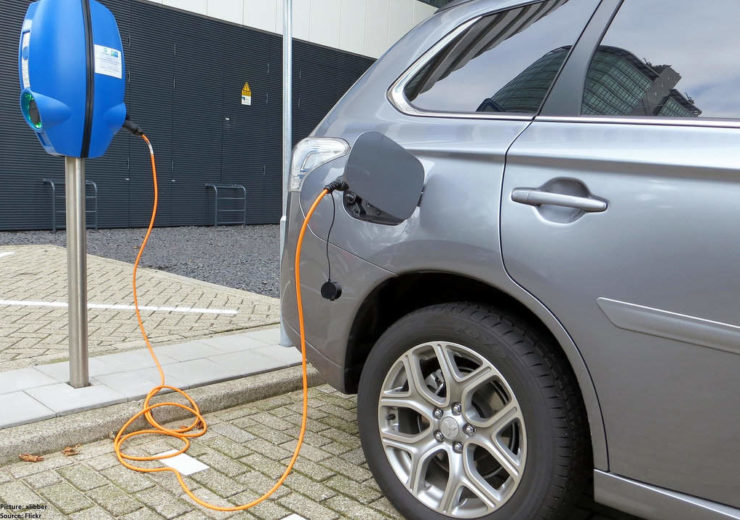A new study by Vivid Economics, on behalf of the WWF, has shown that by accelerating the UK's phase-out of petrol and diesel cars from 2040 to 2030, the electric vehicle industry would dominate the market far more completely - reaching a value of up to £8.7bn, in addition to providing great environmental benefits including a CO2 emissions reduction equal to the power needed for six million homes

An electric car charger (Credit: Flickr/Sino-German Urbanisation Partnership)
The electric vehicle industry in Britain could produce 980,000 vehicles per year, be worth £8.7bn and create 103,000 jobs by 2030 as diesel and petrol are left behind, according to new research.
Business analyst company Vivid Economics has put forward a scenario, based on an in-depth assessment of the automotive sector, in which UK sales of electric vehicles will increase from 21% of the European total to 47% over the next 12 years, while carbon dioxide (CO2) emissions fall by the same amount needed to power six million homes.
NGO World Wide Fund for Nature (WWF) commissioned Vivid Economics to identify the potential impacts of moving the internal combustion engine phase-out – the UK’s commitment to end the sale of all new conventional petrol and diesel cars and vans by 2040 – forward to 2030.
Bringing forward the sale ban a decade was proposed by the Committee on Climate Change in response to the government’s Road to Zero strategy, which was published last month.
The research shows that doing so will lead to the electric vehicle industry taking over the automotive sector much more completely, in addition to proving beneficial to the environment.

Electric vehicle industry and its potential effect on the UK automotive sector by 2030
At the moment the UK produces 1.7 million cars, 93,000 vans and 2.5 million
engines per year, but Vivid Economics predicts that if the phase out of conventional vehicles is conducted ten years earlier, electric vehicles will prove a worth replacement.
Its 2030 phase-out scenario suggests the number of electric cars and vans on the road could increase from about 100,000 today to 20 million, compared to 13 million in a 2040 phase-out.
It also says a 2030 phase-out could increase the scale of charging infrastructure from about 140,000 today to 21 million chargers in 2030, compared to 13 million if conventional motors were gone by 2040.
However, the report shows little difference in the number of jobs created between both scenarios.
Impact on the environment from the electric vehicle industry
Vivid Economic’s 2030 phase-out scenario predicts a reduction in the automotive sector’s CO2 emissions equivalent to 13 tonnes – about the same amount of CO2 produced by six million homes.
If its 2030 phase-out was to go ahead, the reduction in cumulative CO2 emissions by 2050 would total 280 tonnes more than in a 2040 scenario, equal to the emissions from roughly five million homes over a 30-year period.
It also predicts a 68% reduction of nitrogen oxide emissions from conventional cars and vans in 2030 from 134 kilotonnes today to around 42 kilotonnes by 2030, whereas the 2040 scenario would only see it fall to 56 kilotonnes.

This is in addition to a 68% reduction in the pollutant PM10 emissions from about two kilotonnes today to 0.7 kilotonnes, which would translate into an economic value of roughly £300 million per year in 2030.
Moreover, the 2030 phase-out would reduce oil consumption, and therefore net oil imports, by about 4.4 tonnes, a 15% reduction compared to the 2040 scenario.
This would equate to an annual UK saving of £2bn due to avoided oil imports costs.
UK government support for the electric vehicle industry
Much of Vivid Economics’ prediction hinges on the support for electric vehicles the UK government has pledged.
It has announced a number of measures for supporting the industry’s infrastructure, including:
- £400m in workplace and residential charging funding
- A £200m investment fund
- Rapid charging funding, including £80 million to support charging infrastructure deployment
- R&D funding of £40 million funding for new charging technologies including on-street and wireless projects
- New powers under the Automated and Electric Vehicles Bill, allowing the government to set requirements for the provision of charging points


